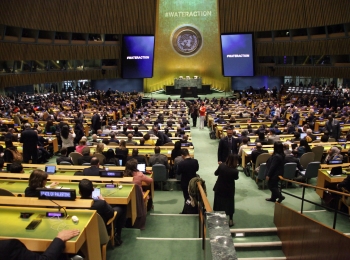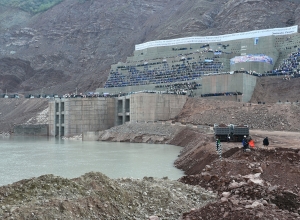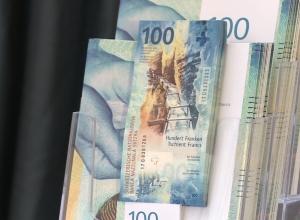2023 UN Water Conference, some personal thoughts
Despite everything we had heard about the 2023 UN Water Conference as a once-in-a-lifetime opportunity, I flew to
In the few months leading up to the event, we had often been told that it would deliver an action plan for reaching SDG targets by the end of 2030: could we really expect a three-day conference to achieve that? Looking at the glass half empty… the water sector is clearly still not on track to reach the SDG6 targets: there are continued uncertainties, and multilateral cooperation – our main tool for achieving the targets – is struggling at the global level. So was all this excitement really justified? Looking at the glass half full… after nearly 50 years, another UN Water Conference was taking place at last, and over the last couple of years, the organizers’ narratives had focused a lot on opportunities, inclusive processes, action-oriented measures and cross-silo partnerships. How could we possibly not be enthusiastic?
In the fast stream, in the slow lane…
The Conference programme showed just how lively the water sector is. It was incredible to see the number of sessions taking place across the three days, often simultaneously – and it was great to observe the packed crowd of committed water professionals. However, my own experience of the late announcement of some events meant that I couldn’t help thinking about the many participants who had to meet extra costs to make it on time – or those who, in the end, may well not have been able to afford the trip at all, because they only finally received replies a couple of weeks before the start of their chosen event.
The limitations on driving forward inclusive processes within the UN were well illustrated by the venue. The UN HQ’s rules meant that the various participants had different statuses. Delegates were able to circulate quite easily in the building and to attend the sessions they wanted. In contrast, civil society representatives had to queue for longer in order to get passes for the plenaries and the interactive dialogues – and they could not get into the cosy areas set aside for country delegations. As a result, I was left with the strange impression of a conference running along various tracks, at different speeds and with differing philosophies… which was hardly likely to foster unity, enable cross-scale or cross-level dynamics or set up widely shared participatory processes. To put this another way, I saw a formal process, lacking in transparency and remaining disconnected from a large proportion of the participants – rather than a process that would help to broaden visions and values for the future of the world’s waters.
Old habits die hard
A lot was said before and during the Conference – and a lot has been said since. I was struck by narratives that continually focused on "opportunities" and "ground-breaking moments" for the water sector: these reminded me of many works that have critically unpacked international water trends, innovations and the ways in which old ideas and practices have been rebranded (Biswas 2008, Molle 2008, Allouche et al. 2015). During the Conference – and especially during the Interactive Dialogues’ (which were far from being either interactive or dialogues) – I heard a lot of the old mantras: "need for cooperation", "necessity to invest in infrastructures", "importance of leaving no one behind"…
I heard a great deal less about empowerment of stakeholders, about justice, about making use of water for development across levels and scales, about redistributing its benefits, about truly participatory decision-making processes, about challenges relating to power and water security, about the difficulties inherent in international law and its implementation in a multipolar, tension-ridden world or about the need for institutional flexibility in the face of climate change and uncertainties. In this regard, the side events involving civil society, community leaders and activists seemed to me to be among the few places where such critical concerns were made more visible and properly discussed – although, unfortunately, in rather piecemeal fashion.
Is big beautiful?
More than 700 pledges have been made, arising directly from the Conference and intended to structure a Water Action Agenda that should help to accelerate progress towards the 2030 targets. More than 700… that is quite an impressive number. However, I am still asking myself if quantity should be the key metric for evaluating the success of the second-ever UN Water Conference. It might actually be useful to enquire more deeply into these commitments, examining and assessing what they actually involve.
Sustainable policy outcomes depend not just on quantity but also, to a large extent, on coherence between actions. So how will these commitments interact? How solid are they? Will they let us pursue shared goals for the water sector? To what extent are they really new…? Or are they merely a way for participating organizations to reiterate their mission statements without necessarily committing to anything new? Last but not least, one important dimension of effective water policy must undoubtedly be its capacity to reach outside the box of water alone. So I am left wondering if these commitments just focus on actors from within the confines of the water community… Or will they allow us to go further, helping to tackle the water wicked problems and complex links with food, energy, ecosystem sustainability, and peacebuilding?
As I travelled home, I still felt the mystery was far from being solved. You might say that this was not much of a surprise, given the complex issues involved: I can only agree. I don’t think anybody thought that this conference would go far towards actually solving the current water crisis. That being said, it is still worth considering whether the Conference managed to produce a comprehensive mid-term review of SDG6 implementation, and whether it made an effective contribution to unpacking the critical issues that hinder progress in the water sector – notably the key political dimensions and all the deep-rooted vested interests at work in any decision related to water management and policy.
References
Allouche J., Middleton C., & Gyawali D. (2015). "Technical veil, hidden politics: Interrogating the power linkages behind the nexus". Water Alternatives, 8(1).
Biswas A. K. (2008). "Integrated water resources management: is it working?". International Journal of Water Resources Development, 24(1), 5-22.
Molle F. (2008). "Nirvana concepts, narratives and policy models: Insights from the water sector". Water alternatives, 1(1), 131-156.
Christian Bréthaut
Professor Christian Bréthaut is the Director of the Education and Knowledge Component of the Geneva Water Hub and the co-lead of the UNESCO Chair in Hydropolitics at University of Geneva. He holds a PhD in Geosciences and Environment from the University of Lausanne. His area of expertise is water governance and policy, with a particular focus on the management of transboundary rivers, the water-food-energy nexus and the science-policy interface.



